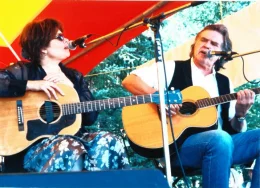
Tim Isberg Prairie Fire TimIsberg.com
Beginning his life in Southern Alberta, as a soldier Tim Isberg was posted to conflict areas including Rwanda and Afghanistan and has seen some of the worst of our human experience. Having explored those events, moods, and themes previously—while also covering more typical troubadour topics including relationships, personal challenges and experiences, climatic factors, and the perils of driving our Highway 2—with Prairie Fire Isberg has chosen to reflect on the people who populated Western Canada during the late 19th Century.
A time of significant change including increased settlement by those from the east and south, destruction of the natural way of life for the Indigenous inhabitants of the land, and the establishment of the North-West Mounted Police and the transcontinental railway, Isberg utilizes knowledge gleaned from historical documents and his own family’s history to populate Prairie Fire. Isberg’s “Devil on Your Back,” (from his debut album Tears Along the Road) is a good stylistic reference point for the songs he has created for Prairie Fire.
Not a chronological or scholarly telling of the land and times, Prairie Fire instead refreshes our understanding of the region by highlighting representative lives whose actions shaped it. Familiar names, places, and events are included (“Ode to Jerry Potts,” “Steel Wheels,” and “Letter from Fort Macleod,”) and on each occasion Isberg explores beyond our passing knowledge to prise details and experiences not as commonly known.
Since childhood, Isberg has been aware of the history of Southern Alberta. Working at Fort Macleod’s Fort Museum prior to his career in the Canadian Forces further sparked Isberg’s interest in the land on which he was raised, and subsequent university study has further enriched his understanding of western Canadian and Indigenous history.
Several of the songs reflect the realities of prairie life through common people including Alberta icon Stewart MacDougall’s “Country Wife Lament,” detailing the challenges of an Indigenous woman abandoned by her white husband. “Letter from Fort Macleod” includes excerpts from letters written by a young NWMP surgeon to his fiancé and tells the story of his experiences, while “Hugh Christie Lancaster” is the tale of Isberg’s great-grandfather who traveled west as a 14-year-old.
Among these strong songs is “Fire Kept Alight,” capturing events from the life of Mary Monkman Tate, a Métis woman confronting increasingly challenging changes to her way of life. The album’s most up-tempo song is the lively “Prairie Fire” and represents the ‘call to arms’ of the Métis in the North-West Resistance/Rebellion of 1885.
Elsewhere, Isberg focuses on events including the railroad (“Steel Wheels,” one of the strongest songs instrumentally) and trade and travel with the Saskatchewan River steam boats (“Fire Canoe.”) Historical events including the Cypress Hills massacre (“Scattered Bones”) and the fiery, drunken exploits of Gilbert Godon (“Manitoba’s First Outlaw”) are provided additional context given Isberg’s perspectives.
The album is bookended by songs significantly more universal while retaining focus on historical circumstances. “Chasing Memories” captures the changes observed by a 19th Century man, from the rivers and streams that guided his life, to the coming of the rails and the death of his spouse. While the former is a melancholy song yearning for the past, “Better Time Ahead” takes an optimistic view toward time rushing forward.
Isberg has a pleasant troubadour’s voice well-suited to his material. As a songwriter, he immerses himself in characters’ experiences, providing voice to those who lived generations ago. Working again with celebrated co-producer and engineer Miles Wilkinson, the album is given a clean and smooth, sonically distinct and balanced aural atmosphere. Musically, the album is further strengthened with excellent musicians forming the core band.
Marc Ladouceur’s guitars and mandolin are prominent, as are Jeff Bradshaw’s pedal steel and Dobro; these two masters are such confident collaborators that one never senses they are competing for space. Ladouceur’s electric guitar gives “Scattered Bones” extra kick. Derek Vokins (bass) and Jamie Cooper (drums) round out the band.
Appearing on select songs, Maria Dunn (accordion) and Shannon Johnson (violin) provide ‘old-timey’ atmosphere with numerous others—including Tammy Weis—providing background vocals. MacDougall, who co-wrote the lyrics of several of these songs with Isberg, is featured throughout on piano.
Isberg concludes his liner notes: “It’s our history—the good and the bad—we should know it and we should own it.” With these twelve original songs, Tim Isberg provides listeners with music to enjoy and appreciate with the added bonus of providing avenues of thought to consider within our western Canadian history.
A bit Lightfooty, kinda Tyson-ish, but wholly Isberg, one is excited to encounter world-class roots music such as this just a few kilometres from home. Tim Isberg’s Prairie Fire is essential listening.
